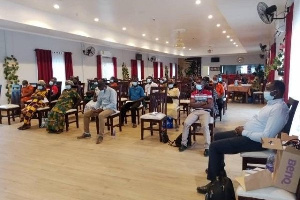 A forum where researchers presented their work to some stakeholders
A forum where researchers presented their work to some stakeholders
A research conducted by a team of researchers from the University of Ghana, has highlighted the need to provide innovative and sustainable micro-credit and support services to farmers to enable them to purchase inputs and practice recommended farm practices.
The research is part of the Agricultural Policy Research in Africa (APRA) programme, a five-year research project that is working to identify the most effective pathways to agricultural commercialization that empowers women, reduce rural poverty, and improve food nutrition security in Sub-Saharan Africa.
Professor Kojo Amanor is the Lead Researcher for the APRA project.
Other members of the research team are Prof Joseph Yaro and Prof Joseph Teye.
According to the research, an innovative financial system that is sustainable and not subject to abuse and free of political strings would empower farmers thereby enhancing productivity and improved the wellbeing of the small cocoa farmers’ household.
It indicated that to successfully grow cocoa now, farmers must invest more in labour, fertilizers, and other agro-chemicals, to ensure that the new high yielding hybrid varieties (abrewabedidi) are currently promoted by COCOBOD-CHED, produce the desired outputs.
It reiterated that yield-enhancing inputs had become necessary due to the vanishing of forests conditions which use to provide natural climate and fertility favourable for cocoa cultivation.
According to the research, however, many farmers could not meet the costs of these inputs, new techniques, and labour.
It said, therefore, many farmers do not use the recommended practices for growing hybrid varieties resulting in poorer yields than expected.
The aim of the research was to understand the long-term changes in cocoa production and the main challenges faced by farmers to inform policy.
This was done by comparing cocoa production in two areas, the Suhum area in the Eastern Region of Ghana and Juaboso in the Western Region.
A total of 241 people were interviewed at Suhum-Ayensuano, including 161 men and 77 women.
In Juaboso 276 people were interviewed, including 172 men and 77 women made up 35 per cent of the sample.
Professor Kojo Amanor, a Lead Researcher for the APRA project, in his presentation at a dissemination workshop in Suhum, noted that inputs were expensive and were provided by private companies; adding that “the more farmers use inputs the more profits go to foreign companies and less to farmers”.
He said the State through COCOBOD provided subsidized inputs and services but these are limited.
He said some farmers were not able to access to pruning and spraying services because of a shortage of State supplied fuel, which necessitates that farmers pay for fuel for the gangs to work on their farms.
He suggested that there should be a credit system where farmers would be able to afford the inputs and pay for labour; saying, this system must be sustainable through carefully crafted innovative mechanisms to retrieve loans.
He cited that loans were paid through mobile money portals that were also used to pay farmers for their output such that deductions could be made directly.
Prof Amanor also touched on the need to adopt a diverse portfolio of strategies that suits different farmer conditions.
He intimated that richer farmers could be encouraged to adopt the productivist model of high inputs and new hybrids, while poorer smaller farmers could diversify by incorporating fruit trees and timber with lower input usage.
He said smart cocoa production that reduced input usage, encourages agro-forestry, deals with climate change, and respects conservation is important to guarantee a steady flow of income and food to small farmers.
“Many of small farmers who get low yields still prefer cocoa, which provides a better income than other crops, provides them with some inheritance for their children, security of land tenure in cocoa plantations, and provides income security in old age.”
Speaking to the Ghana News Agency (GNA) in an interview, Mr Okraku Adeade, Technical Officer at Cocoa Health and Extension Division of the Ghana Cocoa Board (COCOBOD), said access to credit was one of the major challenges within the cocoa industry as certain risks were associated with advancing credit facilities to farmers.
He said COCOBOD would soon roll out the Cocoa Management System (CMS), which would address some of these challenges, saying, “cards will be issued to farmers and this could serve as a guarantee to access credit”.
Madam Charlotte Ansah, a Cocoa Purchasing Clerk, also encouraged farmers to adopt the best farming practices on their farms to improve yields.
She told the GNA that practices such as pruning, proper fertilizer application, and row planting through pegging, was critical to increase yields.
The APRA dissemination workshop brought together researchers, farmers, assemblymen, district agricultural officers, COCOBOD-CHED, local government officials, traditional leaders in Suhum in the Eastern Region, and aimed at discussing and validating the research findings that would inform policy formulation.